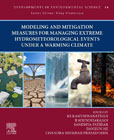
Modeling and Mitigation Measures for Managing Extreme Hydrometeorological Events Under a Warming Climate
KS, Kasiviswanathan
Dr., Soundharajan
Patidar, Sandhya
He, Jianxun
Ojha, C.S.P.
Modeling and Mitigation Measures for Managing Extreme Hydrometeorological Events Under a Warming Climate explores the most recent computational tools, modeling frameworks, and critical data analysis measures for managing extreme climate events. Extreme climate events-primarily floods and droughts-have had major consequences in terms of loss of life and property around the world. Managing extreme occurrences, reducing their effects, and establishing adaptation strategies requires significant policy and planning improvements. This practical guide explores the latest research literature, recent advanced modeling approaches, and fundamental ideas and concepts to provide a variety of solutions for managing extreme events. Discusses the impacts of climate change on the management of water resources Provides flood and drought adaptation measures and strategies Covers the latest research carried out in the modeling of extreme hydrometeorological variables INDICE: 1. Detailed modeling of evaporation loss and operating rules for improved reservoir management 2. Characterizing extreme events in monsoon Asia using remote sensing and land surface model data products 3. D-SciMAP: Integrating drought science, management, and policy in water-scarce areas 4. Application of machine learning approaches for climate change mitigation 5. Non-stationarity analyses of design rainfall using Bayesian approaches 6. Time-varying hydro-climatological extremes and its modeling 7. Water security implications of climate and socio-economic stressors for river basin management 8. Water resources management under climate change and extreme hydrological events 9. Changes in drought characteristics and coping strategies in monsoonal climates 10. Assessment of drought using standardized precipitation index (SPI) - A case study of Tiruchirappalli district (Tamil Nadu) 11. Machine Learning for improving near real-time satellite rainfall estimates useful for flood modeling 12. Using models to understand changing hydrological extremes as a result of climate change: impacts in urban areas 13. Modeling the non-stationarity in the reservoir operation
- ISBN: 978-0-443-18640-0
- Editorial: Elsevier
- Encuadernacion: Rústica
- Fecha Publicación: 01/02/2023
- Nº Volúmenes: 1
- Idioma: Inglés
